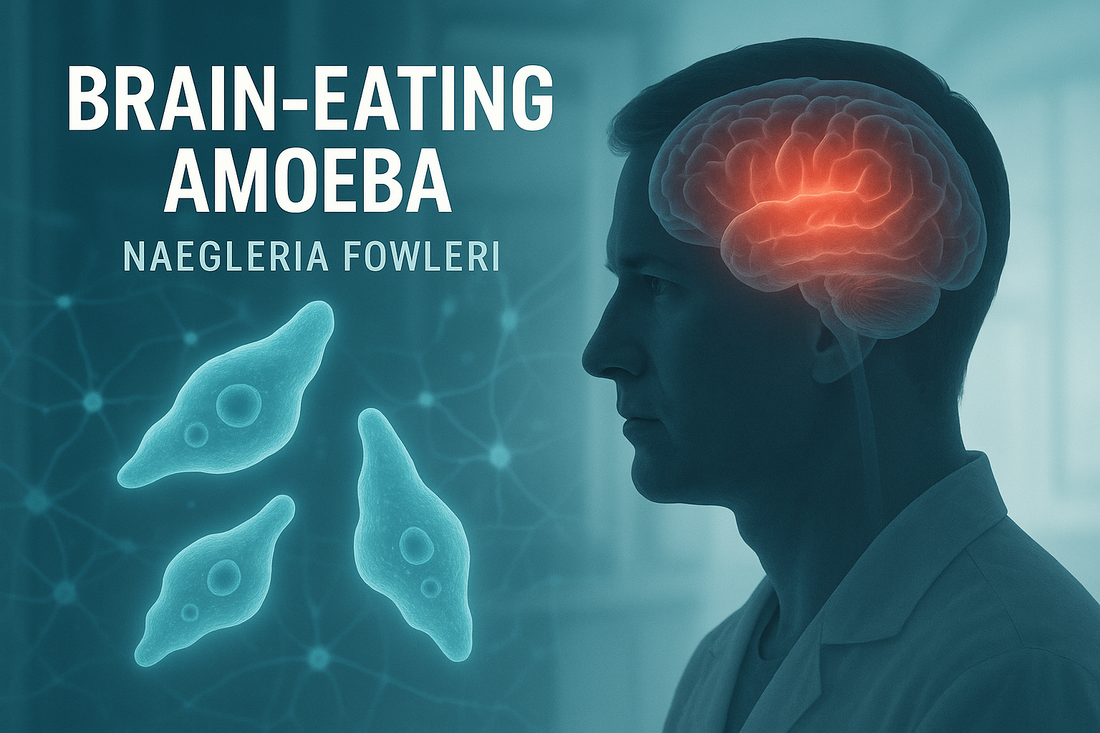
Brain-Eating Amoeba: Ayurvedic Insights to Protect & Strengthen Your Mind & Body
Share
When we hear the term “Brain-eating amoeba”, it sounds like something straight out of a science fiction story — terrifying and unreal. But in reality, this microscopic organism exists and can cause severe, often fatal infections if it reaches the brain. Modern medicine identifies it as Naegleria fowleri, a free-living amoeba found in warm freshwater environments such as lakes, rivers, and even inadequately chlorinated swimming pools.
While the infection is rare, it is extremely dangerous once it occurs. From an Ayurvedic perspective, however, the focus goes beyond just treating infection — it’s about maintaining inner balance, strengthening immunity, and purifying the body so that such pathogens cannot survive or spread inside the system.
Let’s explore how Ayurveda explains such infections, their underlying causes, symptoms, and the natural ways to protect and purify your body and mind.
What is a Brain-Eating Amoeba?
Scientifically, the brain-eating amoeba or Naegleria fowleri is a single-celled organism that thrives in warm freshwater environments. It can enter the body through the nose when a person swims, dives, or cleans their nasal passage with contaminated water. Once inside, it travels to the brain and causes a condition called Primary Amoebic Meningoencephalitis (PAM) — a serious infection of the brain and its surrounding tissues.
In modern medicine, the symptoms usually begin within 1 to 12 days after exposure and progress rapidly. These may include headache, fever, nausea, vomiting, stiff neck, confusion, seizures, and even coma. Most cases are fatal, which is why early awareness and preventive care are crucial.
Ayurveda, the ancient Indian system of medicine, doesn’t describe Naegleria fowleri by name, but it gives detailed insight into microbial imbalance, toxins (ama), and mind-body connection that align with this condition.
Understanding the Infection Through Ayurveda
Ayurveda sees diseases not just as external invasions but as manifestations of inner imbalance. The human body is governed by three primary doshas — Vata, Pitta, and Kapha. When these energies are balanced, health is maintained. When disturbed, diseases find their way.
In the case of a brain-eating amoeba infection, Ayurveda would consider multiple internal imbalances:
- Pitta aggravation: leads to inflammation, fever, and burning sensations in the head region.
- Vata imbalance: disturbs the nervous system and causes confusion, stiffness, and tremors.
- Ama accumulation: toxic buildup in the body weakens immunity and allows external pathogens to invade.
According to Ayurvedic philosophy, such infections indicate that the body’s natural defense (Ojas) has been compromised. Ojas is the essence of all body tissues, representing strength, vitality, and immunity. When Ojas is weak, even minor pathogens can cause major harm.
Causes of Brain-Eating Amoeba Infection (Ayurvedic View)
Ayurveda always emphasizes understanding the root cause (Nidana) rather than only the symptoms. The entry of microbes like Naegleria fowleri is secondary — the primary issue lies in the internal environment that allows it to thrive.
Here are some Ayurvedic causes and contributing factors:
- Weakened immunity (Oja kshaya) – When the body’s natural resistance declines due to poor lifestyle, irregular food habits, or lack of sleep, it becomes more prone to infections.
- Exposure to contaminated water – Swimming or bathing in stagnant or dirty water introduces harmful microorganisms through the nasal cavity.
- Accumulation of ama (toxins) – Undigested food and waste buildup reduce cellular intelligence, creating a fertile ground for disease.
- Pitta aggravating habits – Excessive heat exposure, spicy foods, alcohol, and anger increase internal heat, making the brain region more vulnerable.
- Weak nervous system (Vata imbalance) – Irregular routine, anxiety, and overthinking weaken the nervous system, affecting brain resilience.
- Seasonal influence (Ritu dosha) – In hot and humid conditions, microorganisms multiply rapidly. Ayurveda links this to Grishma and Varsha ritu, seasons when Pitta and Kapha fluctuate.
Symptoms and Ayurvedic Interpretation
The early symptoms of brain-eating amoeba infection are often mistaken for sinus infections or meningitis. Ayurveda explains these symptoms as signs of doshic disturbance in the head region (Shiro roga).
| Modern Symptoms | Ayurvedic Interpretation |
|---|---|
| Headache and fever | Pitta and Vata imbalance in the head |
| Nausea and vomiting | Agni (digestive fire) disturbance |
| Neck stiffness | Vata obstruction in the neck channels |
| Confusion and seizures | Imbalance in Majja dhatu (nervous tissue) |
| Loss of smell | Kapha obstruction in nasal passages |
In Ayurveda, this condition may be related to Dushta Kapha and Pitta attacking the Majja dhatu, leading to inflammation, impaired brain function, and disturbance in consciousness.
Ayurvedic Detox and Cleansing Approach
Ayurveda strongly believes that before any treatment, the body must be detoxified. Removing toxins clears the channels (Srotas) and enhances the immune system’s ability to fight infections.
1. Panchakarma Detoxification
Panchakarma is a therapeutic process that purifies the body through five main cleansing procedures. In the context of brain and nervous system health, the following therapies are particularly useful:
- Nasya (Nasal therapy): Application of medicated oils in the nasal passage helps cleanse toxins from the head region and strengthen the brain. Oils like Anu tailam or Shadbindu tailam are traditionally used.
- Virechana (Purgation): Helps flush out Pitta and toxins from the intestines, cooling down inflammation.
- Basti (Medicated enema): Balances Vata, which supports the nervous system and brain function.
- Abhyanga (Oil massage): Full-body oil massage improves circulation and relieves stress, indirectly boosting Ojas.
- Shirodhara: Pouring warm herbal oil over the forehead calms the nervous system and helps restore mental balance.
(If you wish to experience authentic Panchakarma treatments, you can explore specialized programs available through our product section.)
Herbs That Support Brain Health and Immunity
Ayurveda offers powerful herbs that nourish the brain, support immunity, and reduce inflammation. Some herbs that can play a protective role against infections like the brain-eating amoeba include:
1. Brahmi (Bacopa monnieri)
Known as a “brain tonic,” Brahmi enhances memory, calms the mind, and strengthens the nervous system.
2. Shankhpushpi (Convolvulus pluricaulis)
Supports cognitive function and balances Pitta in the brain region.
3. Ashwagandha (Withania somnifera)
Boosts Ojas, reduces stress, and improves brain resilience against toxins.
4. Guduchi (Tinospora cordifolia)
A potent immunomodulator and natural detoxifier that protects the body from microbial invasion.
5. Turmeric (Curcuma longa)
Curcumin in turmeric has anti-inflammatory and antioxidant effects that protect the brain from infections and oxidative stress.
6. Triphala
A blend of three fruits (Amalaki, Haritaki, Bibhitaki) that supports digestion, detoxification, and immune balance.
7. Tulsi (Holy Basil)
Acts as a natural antimicrobial and supports respiratory and nasal health.
These herbs, when used correctly under expert guidance, can help strengthen your system from within.
Ayurvedic Diet and Lifestyle Tips
Ayurveda emphasizes that even the best herbs won’t work without proper diet and routine. Here are some holistic suggestions:
- Eat freshly cooked, warm, light meals.
- Avoid stale, processed, or junk food.
- Include ghee, turmeric, cumin, coriander, and ginger in your daily diet.
- Stay hydrated but avoid drinking contaminated or unfiltered water.
- Perform Jal neti (nasal cleansing) only with sterilized, boiled, and cooled water.
- Sleep early and wake up early to balance your circadian rhythm.
- Practice deep breathing and meditation to calm the nervous system.
- Avoid swimming in untreated or warm stagnant water sources.
Strengthening Immunity and Mind Protection
From an Ayurvedic standpoint, prevention is the true medicine. Strengthening the mind-body connection and enhancing Ojas can make the body naturally resistant to microbial threats like Naegleria fowleri.
- Daily Rasayana (Rejuvenation therapy): Herbs like Brahmi, Guduchi, and Ashwagandha can be consumed as Rasayanas to promote long-term brain health.
- Pranayama and Yoga: Practices like Bhramari pranayama and Anulom Vilom improve brain oxygenation and reduce stress.
- Regular Detox: Seasonal Panchakarma cleanses remove ama and keep Srotas (channels) open.
- Positive Emotions: Ayurveda links mental health directly to immunity. A peaceful mind nurtures a strong body.
(Those who want to learn authentic Ayurvedic detox and brain-care techniques can explore courses offered by our academy.)
Modern Medicine vs. Ayurvedic Approach
While modern medicine focuses on direct eradication of pathogens using drugs, Ayurveda focuses on making the host body stronger so that such organisms cannot invade.
Modern science is still researching effective treatments for brain-eating amoeba infection, as most current therapies are supportive and experimental. Ayurveda complements this by offering preventive and supportive care through immune strengthening, detoxification, and mind purification.
A combined approach — modern medical care for emergency treatment and Ayurveda for preventive and supportive healing — offers the best protection.
Prevention According to Ayurveda
Here are simple Ayurvedic preventive measures to protect yourself from harmful microbes:
- Always use clean, filtered, or boiled water for nasal rinsing or swimming.
- Avoid swimming in warm lakes, rivers, or pools that may not be chlorinated.
- Keep your Agni (digestive fire) strong through proper food and routine.
- Do Nasya therapy once or twice a week with a few drops of Anu Tailam to cleanse nasal passages.
- Follow seasonal detox routines to keep the body’s internal environment clean.
- Avoid overheating and dehydration during hot weather to balance Pitta.
- Maintain mental calmness — emotional heat can increase Pitta imbalance and weaken immunity.
When to Seek Medical Help
Ayurveda encourages awareness and early action. If you experience symptoms such as severe headache, high fever, vomiting, stiff neck, confusion, or loss of balance after swimming or using nasal water, seek immediate medical care. Ayurveda can support recovery but should not replace emergency medical attention in such life-threatening infections.
Conclusion
The brain-eating amoeba reminds us how delicate yet powerful the human body truly is. Ayurveda teaches that when we maintain inner purity, balance, and strength, external microbes lose their power.
Through detoxification, herbs, and daily mindfulness, you can protect not just your brain but your entire system from imbalance and disease. Ayurveda reminds us — health is not just freedom from disease, but harmony between body, mind, and spirit.
For regular health tips & updates visit Ayushakti’s Social Media Pages:
- Facebook – Ayushakti Ayurved | Facebook
- Instagram – Ayushakti Ayurved (@ayushakti)
- Pinterest – ayushaktiayurveda
Get all the updates about Ayushakti Ayurved on WhatsApp directly. Click here to Join our WhatsApp Channel
Ayushakti's mission is to help people in every way possible. Our Ayurvedic experts are available to give you a consultation either over the phone or through a video consultation. We recommend customised diets, home remedies, and detox therapies to help you recover from health problems. Book your consultation now!
If you would like to know the location or visit one of our centres, please click here: https://www.ayushakti.com/home/p/contact
For more information, write to us at info@ayushakti.com or call our toll-free numbers: 18002663001 (India) and +18002800906 (Global).
Blog Author: Dr. Ramchandra Konduskar
Expert Review: Dr Smita Pankaj Naram
Co-Founder, Ayushakti Ayurved Pvt Ltd
Disclaimer: This blog is for educational purposes only. Please consult an Ayurvedic practitioner before trying or consuming any medicines, home remedies or treatments mentioned in this blog. The information provided is not intended to diagnose, treat, cure, or prevent any disease.





